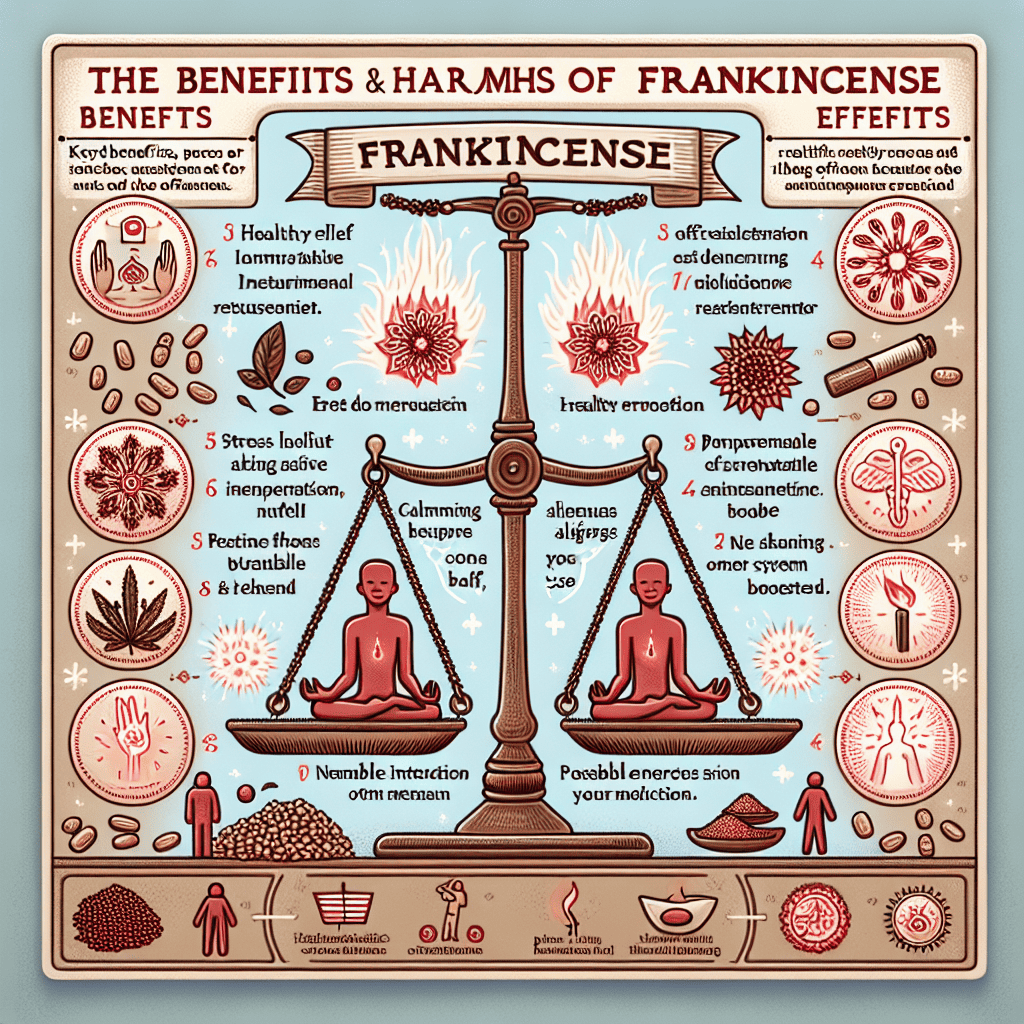Introduction: Frankincense has a rich history in traditional medicine and is known for its potential health benefits. This blog post delves into the benefits and potential harms of using both frankincense and frankincense oil for health and wellness, helping you weigh the pros and cons before adding them to your daily routine.
Table of Contents
The Harms of Frankincense
Understanding the potential risks and harms associated with using frankincense.
- The Harms of Male Frankincense:
Frankincense, a popular resin with a long history of medicinal and ceremonial use, is typically safe for adult males when used appropriately. However, it’s essential to note that even natural remedies like male frankincense can trigger allergic reactions or irritate the skin when applied topically. Individuals with sensitive skin or a history of allergies should exercise caution and consider conducting a patch test before using products containing this substance. Those who experience any adverse reactions should discontinue use immediately and seek medical advice.
For pregnant and breastfeeding women, the use of male frankincense requires extra vigilance. While there isn’t comprehensive data on the safety of frankincense resin during pregnancy and lactation, it’s generally recommended for these individuals to avoid using it altogether. Given the potential risks involved in using certain substances during these sensitive periods, erring on the side of caution is advisable. Expectant and nursing mothers should consult with healthcare providers before introducing any new products or treatments to their routine to ensure the safety of both themselves and their babies.
In cases where safety information is limited and potential risks are present, such as with male frankincense for pregnant or breastfeeding women, careful consideration and awareness are paramount. It’s always recommended to prioritize the well-being and health of individuals, particularly those in vulnerable groups. Before using any new substance or undergoing a new treatment, thorough research, consultation with healthcare professionals, and monitoring for any adverse effects are crucial steps to take. By staying informed and making informed decisions, individuals can better safeguard their health and make choices that align with their wellness goals and needs.
The Benefits of Frankincense
Exploring the numerous health benefits associated with using frankincense.
- Fighting Some Types of Disease:
Frankincense has been found to be effective in cancer prevention due to its compounds that can inhibit the formation of cancer cell DNA. This property makes it beneficial in reducing the risk of several types of cancers such as breast, prostate, pancreatic, skin, and colon cancer. By targeting the DNA of cancer cells, frankincense can help in slowing down the growth and spread of these diseases, potentially offering a natural and complementary approach to cancer prevention and treatment.
Apart from its cancer-preventive properties, frankincense is also known for its oral health benefits. It can effectively address oral diseases, gum problems, bad breath, toothaches, and oral ulcers. By incorporating frankincense into oral care routines, individuals can potentially experience relief from common dental issues and maintain better overall oral hygiene. Moreover, the anti-inflammatory and antimicrobial properties of frankincense can contribute to its efficacy in treating oral health conditions.
Furthermore, frankincense is beneficial in managing respiratory conditions such as asthma and bronchial diseases. The anti-inflammatory properties of frankincense can help in reducing inflammation in the respiratory system, easing breathing difficulties, and providing relief from symptoms associated with asthma and bronchial issues. Its soothing effects on the respiratory tract make frankincense a natural remedy that can be used to complement conventional treatments for respiratory conditions, offering a holistic approach to respiratory health and well-being.
The Benefits of Frankincense Oil
Delving into the potential health benefits of frankincense oil.
- Improvement of Psychological Condition and Stress Reduction:
Frankincense oil has been used for centuries due to its numerous benefits for both physical and mental well-being. When inhaled, the oil is known to have a calming effect on the mind, helping to reduce stress and promote relaxation. This can be particularly helpful for individuals dealing with anxiety or those looking to unwind after a long day. Additionally, the aroma of frankincense oil has been shown to enhance psychological well-being, creating a sense of peace and tranquility.
Aside from its psychological benefits, frankincense oil also offers a range of advantages for the body. It is often used to strengthen hair roots, promoting healthier and more resilient hair growth. The oil’s antiseptic properties make it beneficial for wound healing, as it can help prevent infections and promote faster recovery. Furthermore, frankincense oil is frequently used in skincare due to its ability to treat acne and soothe insect bites. Its anti-inflammatory and antimicrobial properties can help reduce redness and swelling associated with acne, while its calming effect can provide relief from insect bites, reducing itching and discomfort.
Overall, incorporating frankincense oil into your wellness routine can have a variety of positive effects on both your physical and mental health. Whether you choose to diffuse the oil for its relaxation benefits, apply it topically for skincare purposes, or use it to promote hair health, this versatile oil can be a valuable addition to your self-care regimen. By harnessing the holistic benefits of frankincense oil, you can support your overall well-being and enhance your quality of life in a natural and rejuvenating way.




